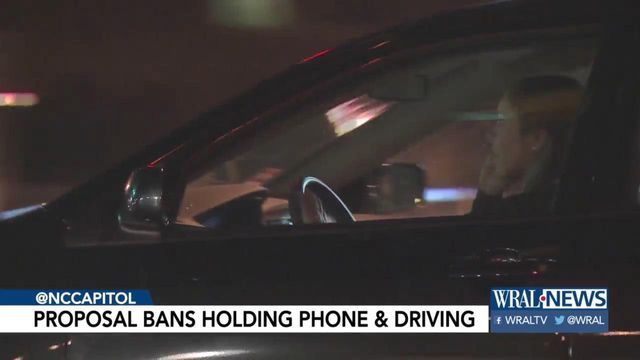Lawmakers mull plan to ban drivers from holding cellphones while behind the wheel
A bill that would force North Carolina drivers to put down their mobile phones while on the road is working its way through the state House. But it has plenty of miles ahead of it.
Posted — UpdatedHouse Bill 144 would ban drivers from holding a mobile phone or having it on their laps while they're on the road – even when they're at stoplights or in traffic.
Drivers over 18 could still talk on the phone but wouldn't be allowed to enter phone numbers. The phone would need to be either mounted within the car or linked through the car's Bluetooth.
Drivers under 18 are already banned from using a cellphone while driving. That wouldn't change.
Rep. Kevin Corbin, R-Macon, the bill's primary sponsor, called distracted driving "the drunk driving issue of this generation of lawmakers."
"We've had cellphones for decades now. But it was when smartphones and their access to the internet became commonplace that we witnessed this steady increase in crashes, injuries, and unfortunately, fatalities," Corbin told the House Transportation Committee on Tuesday.
Sixteen states have hands-free laws.
The most recently enacted one is Georgia, where advocates say distracted-driving crashes fell by double digits and traffic congestion eased in just a few months. Corbin said all military bases in the U.S. also ban the use of hand-held mobile devices by drivers.
Co-sponsor Rep. John Torbett, R-Gaston, said distracted-driving crashes and deaths have been increasing over the past few years.
In 2016 alone in North Carolina, 54,000 accidents were blamed on it, and 171 people were killed in those wrecks.
Another co-sponsor, Rep. Jon Hardister, R-Guilford, said the numbers won't improve unless lawmakers take action.
"As a Republican, I tend to not be very excited about regulation, about telling people what they can and cannot do. But your liberty has to stop when your actions put others in danger," Hardister said.
Some of their fellow Republicans pushed back.
Rep. Michael Speciale, R-Craven, said he doesn't believe distracted driving is equivalent to driving while impaired.
"There's stupid stuff that goes on in vehicles, and I'm pretty sure it's already against the law to do something that takes your attention off of your driving, so I really think this is unnecessary," said Speciale. "I think we’re becoming more and more of a nanny state."
Rep. Dana Bumgardner, R-Gaston, agreed with Speciale, noting that there's already a law on the state's books that bans texting and emailing while driving.
"To equate this to impaired driving is shameless," Bumgardner protested. "We’re going to end up enforcing every minute of every day of every person’s life with this kind of stuff."
One speaker at the meeting, Tammy Garlock, became an advocate after losing her teenage son in a distracted driving accident 12 years ago.
She told lawmakers the current ban on texting while driving isn't working, because drivers can always say they were using their GPS or making a phone call, both of which are allowed under current law.
"Law enforcement is not able to enforce the current no-texting law that's on the books as it is, because how do you know they weren't dialing a number?" she asked. "The only way to enforce a ban on doing things other than talking is to get the phone out of the hand."
"We're not here to infringe on your rights. But we are here to make sure others don't infringe on your rights as well," responded Torbett.
House Bill 144 has more than 40 bipartisan sponsors, as well as the backing of the auto insurance industry, the state insurance commissioner, consumer safety groups, the State Highway Patrol and law enforcement leaders.
A recent poll by Meredith College shows widespread support among the state's voters as well. Still, it has to survive four more committees before it reaches the House floor. Its prospects in the Senate are unclear.
Related Topics
• Credits
Copyright 2024 by Capitol Broadcasting Company. All rights reserved. This material may not be published, broadcast, rewritten or redistributed.






